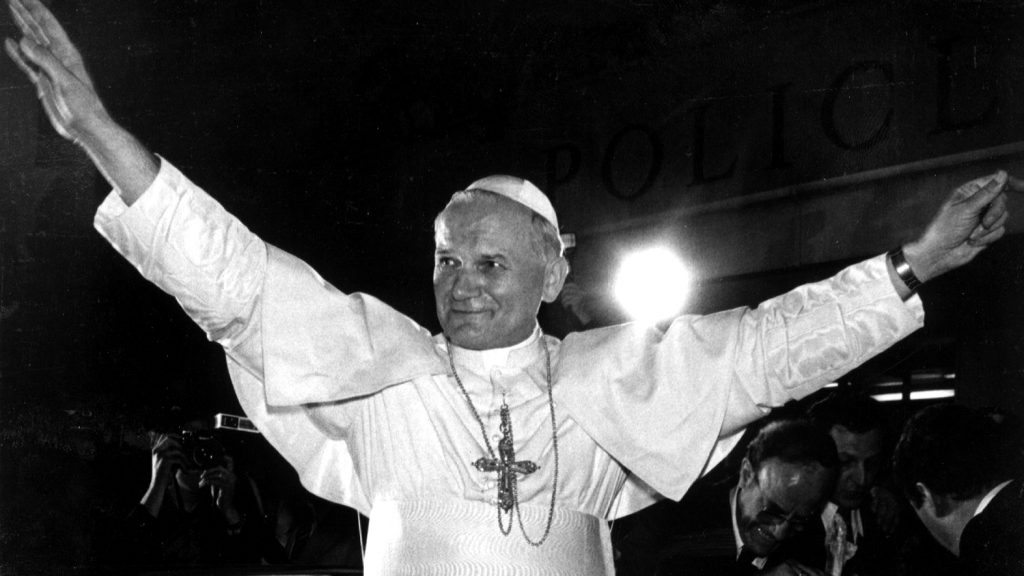Commemorating the centenary of the birth of St. John Paul II, a number of key commentators used the occasion to do more than just remember and praise the late pope's rich legacy.
Many used it as an opportunity to appeal for a rediscovery of his faith, teachings and life in order to make them a part of today's conversations and plans of action for now and the future.
This year's May 18 commemoration was, in essence, a call for the release of a JP2, 2.0.
Pope Francis led the way by writing that his predecessor's 84 years of life and 27-year-long pontificate left a "living legacy" to the church.
Penning the preface to a commemorative book, "A Celebration: In Words and Images" about St. John Paul, Pope Francis said he did not want people to engage in a superficial, "self-referential" celebration of praise, but to look deeper and actually "tap into the wellspring of this extraordinary man, priest, bishop and pope."
So much of what has been written and produced this year -- documentaries, interviews with people who knew him, essays and special editions by Vatican media, is re-presenting who this pope was for so many people, the church and the world.
And, in some instances, setting the record straight.
One of those voices was retired Pope Benedict XVI, who was a very close collaborator after Pope John Paul appointed him to lead the Congregation for the Doctrine of the Faith in 1981.
In a letter to Polish bishops commemorating the centenary, the 93-year-old retired pope reaffirmed that "John Paul II is not the moral rigorist" some people have portrayed him as being.
Addressing an assumption that Pope Francis has in some way radically broken with his predecessor, Pope Benedict wrote that so much holds the two in common, particularly the "centrality of divine mercy."
St. John Paul insisted that "God's mercy is intended for every individual," and it is with these always open arms of mercy that God gives people the never-ending opportunity to accept "the moral requirement for man, even if we can never fully meet it."
Many commemorative notes underlined how much St. John Paul actively and concretely lived the Gospel -- it wasn't a static book of rules, but an open invitation of friendship to walk with the Lord.
This is the take-away many who knew the saint said needed to happen with his own teachings, too. That, in fact, was the aim of refounding the Pontifical John Paul II Theological Institute for the Sciences of Marriage and Family in 2017.
Not only is it harmful to "ideologize" St. John Paul, it would be "intellectual laziness" to believe all answers can be found and defended within a fixed framework "beyond which there would be nothing more to say," Msgr. Pierangelo Sequeri, the institute's president, said at the time.
The formal launch May 18 of the St. John Paul II Institute of Culture at the Pontifical University of St. Thomas Aquinas in Rome follows the same vein.
"Education today cannot be only about the past, different ideas that we want to put into the heads of our students," said Dominican Father Michal Paluch, university rector.
They do not want the institute to just repeat what John Paul said and did, the rector said, "but we want to make him a partner in our conversation" and "leave seeds deep in the hearts and minds of our students."
But a review of the past also may hold some bitter lessons for today, particularly in how the church handles members suspected or guilty of abuse or its cover-up.
Msgr. Slawomir Oder said he and investigators of the pope's sainthood cause found no evidence the pope knowingly neglected or covered up abuse scandals -- nothing that could possibly cast "a shadow of guilt in regard to John Paul II."
But, he told reporters, the Polish pope's experience under communism made him less inclined to believe unsubstantiated accusations since false rumors against clergy had long been used as weapons to discredit the church.
When it was clear to him there was abuse by clergy, the pope in 2001 apologized "unreservedly to the victims for the pain and disillusionment caused to them" and decried sexual abuse by clergy as being "a profound contradiction of the teaching and witness of Jesus Christ."
Coming to terms with the past had been a hallmark of St. John Paul, who apologized for scores of wrongdoings by members of the church throughout history, from the Inquisition to the silence and inaction of many Catholics during World War II when their Jewish neighbors disappeared.
That need to face the past and make amends when it comes to abuse has been growing in Poland where two brother-filmmakers have released documentaries around the late-pope's birthday -- this year with "Hide and Seek" and last year, "Tell No One."
Though neither film explored the role of the late pope, both films sparked discussion and action on addressing abuse and its cover-up in the church in Poland, culminating in Archbishop Wojciech Polak of Gniezno, the primate of Poland, asking the Vatican to investigate the film's allegation of cover-up by a bishop.
The revelations of abuse are not attacks against the church, the archbishop said May 17, but are key to its "cleansing."
Looking at past wrongs not as an attack, but as a chance for a "profound examination of conscience" and a "purification of memory" was central to St. John Paul's "Day of Pardon" during the Great Jubilee of 2000.
He invited people to kneel before the God of mercy "and implore forgiveness for the past and present sins of her sons and daughters."
That part of that pope's legacy -- that the faithful carefully recognize "their own sins (and) the sins of yesterday's Christians" -- still finds a needed place today.

